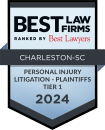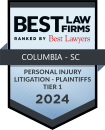
When we talk about holding people liable when they harm other people, we often talk about “negligence.” The injury victim needs to prove that the at-fault party was negligent, meaning they didn’t take reasonable care to prevent harm. In a car accident, that might mean not using a turn signal before changing lanes. In a medical setting, that might mean not checking whether a patient was allergic to any drugs before administering them.
Does that mean all cases of medical negligence are grounds for a medical malpractice lawsuit? No. And not all bad outcomes are examples of medical negligence. However, if you’re seeking compensation after being harmed by a healthcare professional, you will need to hire a lawyer that knows and understands the difference.
What is a Bad Outcome?
A bad outcome can refer to any situation where a patient’s health worsens after treatment. But a bad outcome does not always mean negligence was involved. You are never guaranteed a successful medical outcome.
For example, a particular surgery may have a 90% success rate. Although that means the surgery is generally very safe, it still means 10% of people who undergo the surgery may experience complications, even if the surgeon, anesthesiologist, and attending nurses did everything right.
In another example, someone prescribed a medication could suffer no negative side effects, while another person with the same condition and level of general health could suffer from every negative side effect listed on the warning label. Healthcare providers must provide the treatment that they believe will provide the best likelihood of a good outcome.
Fault could come into play, however, if the surgeon did not inform the patient of the success rate of the surgery beforehand, or did not discuss alternate treatment options with less severe potential side effects.
What is Medical Negligence?
Sometimes bad outcomes are the fault of negligence. Medical negligence is when an entirely preventable mistake occurs that results in harm to the patient.
For example, many doctors perform examinations with latex gloves. If a patient was allergic to latex, but the doctor made an honest mistake and forgot to ask before beginning the examination which resulted in the patient developing an allergic reaction, it could be an example of negligence.
Further, people who are allergic to latex are also often allergic to certain foods, including tomatoes. If a doctor sees that a patient’s chart lists a tomato allergy, they know that their patient may also have a latex allergy. If they decide not to ask about a latex allergy or to take precautions, and then the patient develops an allergic reaction to the latex gloves, this could also be an example of negligence because the doctor’s deliberate action (or inaction) caused the patient harm.
A more extreme example of medical negligence could be a surgeon, nurse, or other operating room medical provider accidentally leaving a sponge behind in a patient after a surgery.
Other extreme examples of medical negligence could include failing to order a necessary diagnostic test, leading to a delayed diagnosis that severely worsened a patient’s health, or ordering an unnecessary surgery to make more money off the patient.
What is Medical Malpractice?
In South Carolina law, the terms medical malpractice and medical negligence are interchangeable. However, that doesn’t mean that every incident of medical negligence rises to the level of needing to file a medical malpractice lawsuit. In fact, South Carolina law sets the bar higher for bringing medical negligence suits than in other personal injury matters.
For example, before filing a medical malpractice lawsuit you must first go through a series of procedural hurdles, including filing an affidavit from a court-qualified medical expert witness saying they believe medically negligent action (or inaction) caused your harm and violated state laws.
If you are unsure whether the medical negligence that caused your illness or injury qualifies for a malpractice lawsuit, we recommend calling Joye Law Firm today. We’ll arrange a confidential consultation with a registered nurse, and an experienced South Carolina medical malpractice attorney will provide a free case evaluation.
How Do I Prove Malpractice?
To have a successful medical malpractice or negligence claim, the victim must be able to prove the following:
- The victim had a doctor/patient relationship with the healthcare provider who harmed them.
- The healthcare provider breached the duty of care owed to the victim (meaning they did not act how any other well-intentioned doctor with the same knowledge would).
- The victim was directly harmed because of this breach of care (meaning it was not simply a bad outcome unrelated to negligence).
- The victim suffered damages (usually meaning worsened physical health that required additional treatment, as well as worsened emotional health or even additional physical pain).
Health care providers are well-protected against medical malpractice claims, which means pursuing a lawsuit can require an intense investigation and a lot of evidence, making them almost impossible to win on your own. Having a personal injury lawyer specifically experienced with medical malpractice claims to navigate this process can make a huge difference.
Contact Us Today for a Free Medical Malpractice Case Evaluation
Medical malpractice claims are typically far more complex and difficult to win than other types of personal injury. For most victims of medical malpractice, you have three years from the date of the malpractice, or three years from the date you became aware of the malpractice (up to six years from the date of the malpractice itself) to file a claim. So, don’t let it pass you by and miss your chance for deserved compensation.
Medical malpractice is often expensive, and even deadly, for victims. If you or someone you love experienced medical malpractice, call our firm today to learn what your next steps should be.

































